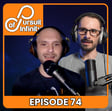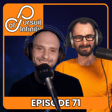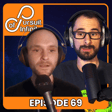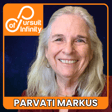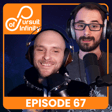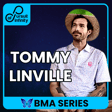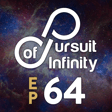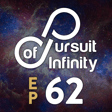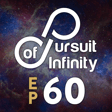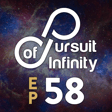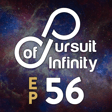Introduction: Psychedelics and Society
00:00:00
Speaker
Hello and welcome to Pursuit of Infinity, a podcast where we explore the depths of human consciousness and delve into the fascinating world of psychedelics. This week, we embark on a thought-provoking journey to examine the psychedelic movement in both its hindrances and the potential it holds for our collective future.
00:00:18
Speaker
It's an intricate web to navigate, but it's essential that in this time of psychedelic resurgence, we strive to foster a future where these substances are not only recognized, but integrated responsibly and ethically into our society. But before we get to it, for all things Pursuit of Infinity, visit our website, pursuitofinfinity.com, where you'll find all the links to the many places you can follow us.
00:00:42
Speaker
If you want to support the show, the easiest way to do that is to give us a follower, a sub, as well as a five star rating and a review. These things have a huge impact on those pesky algorithms and they really help us to expand our reach. You can also show us some support by heading over to our Patreon at patreon.com slash pursuit of infinity. And if you didn't know, we have a YouTube channel. All of our episodes are always posted there in video format, as well as an array of shorts that we've been putting together on a regular basis.
00:01:13
Speaker
Now with all that out of the way, thank you so much for listening and I hope you enjoy this week's discussion.
Case Study: Psychedelics and Tragedy at Beyond Wonderland
00:01:33
Speaker
On June 17th, there was this music festival. I don't know if you've ever heard of it.
00:01:39
Speaker
called Beyond Wonderland. It's like an electronic music festival. And there was an incident. There was a shooting at this music festival. There was a couple that was engaged. They were both killed. And there was a few injuries as well.
00:01:58
Speaker
And what really makes me bring this up, of course, it's like super tragic when a shooting happens and someone dies or anyone gets hurt. You know, obviously that's the main, the main focus of, um, of anyone's concern regarding a shooting. But what makes this relevant to us is that apparently this guy who, who.
00:02:22
Speaker
unloaded on people it happened in like an overflow campground and He was an army guy I guess his residence was stated as one of the army bases that were around the area so he was like active military and He just I guess openly just randomly started shooting people in this campground and he told the police that he had taken psychedelic mushrooms and thought the world was gonna end so
00:02:51
Speaker
took out a firearm and started shooting people. Now, this brings up a few things that I think are necessary to talk about.
Safe Use of Psychedelics: Set and Setting
00:03:00
Speaker
One is set in setting, dude. Like you should never be taking a psychedelic with a firearm in your vicinity. Can I ask a question about it quick? Yeah. So he's alive. They took him alive. Is that what you? Yes, he's alive. So he's like surrendered, I guess. Okay.
00:03:21
Speaker
Wow, that's pretty crazy. Yeah. But you're right. Okay, yeah, you go ahead and set and setting. But I mean, yeah, dude, you should never be taking a psychedelic when you have a firearm around you. It's just, yeah, this is the thing that is it's gonna make this movement crumble. It's like the same way that it happened in the 60s. The kids
00:03:42
Speaker
took advantage of a situation where they were uninformed, they were using the substances in a reckless way. And it seems that that's sort of what's happening now. You know, you look at all these people who just have like these chocolate bars with
00:03:59
Speaker
you know, amazing like illustrations and colorful graphics all over them. And they're just being touted as not a big deal. But these substances are a huge deal and need to be respected. Yeah, they're being treated as treated as recreational and like
00:04:15
Speaker
Just the whole conversation we have in our culture around drugs as a whole is so like misguided and strange and they just lump these powerful life changing substances in with the umbrella term of drugs. But when you said that story like the thing that struck me as kind of like ironic about it is.
00:04:35
Speaker
you know, like psilocybin used under the proper circumstances, the right set and setting, is been found to be so beneficial for soldiers and stuff like who suffer from PTSD. It's like, it shows the dichotomy of that, like, you got someone who takes it, thinks the world is ending,
00:04:58
Speaker
they take it in not the smartest setting with a gun around just all does all the wrong things and ends up committing a horrible act and then on the other side of that you have soldiers who are suffering from PTSD who may have fallen down that road just in time through their mental health disorder but they end up taking psilocybin in the proper way in the proper setting with help and it changes their life for the better and cures them so it's like a little bit of irony there I think
00:05:28
Speaker
Yeah, and you hear people say that the set and setting is more important than the substance itself. And there was a point in time where I'd hear that and say, yeah, okay, whatever. I understand why you're saying that, but.
00:05:40
Speaker
In all honesty, like you need the substance. That's what the whole thing is about. But this is a circumstance where that is exemplified in my view. And I totally agree with that too. Like you said, it's more important than the substance itself. It's so powerful. Psilocybin is so powerful.
00:05:58
Speaker
there is a chance you're going to have a challenging experience where you might believe seriously believe that the world is ending or you're dying or something horrible is going to happen and if you're in the wrong setting and have the wrong state of mind that could just like spiral and you can
00:06:15
Speaker
you know, fall into that and then act on it. Like that's like what you said, it's like never have like a gun around. That's insane. I mean, see, that's the thing. People who think this is just a recreational substance, these things are just like something to take lightly and, you know, enjoy yourself.
00:06:34
Speaker
it's like it could go a totally different direction and it's not one of the you know substances that you could use and then convince yourself that it's just a substance like when you're deep in the throes of a you know a troubling trip you can't just be like oh it's just a drug i'm gonna be fine because what people don't realize is it's so powerful that it's not just a drug you know like you're truly experiencing it and there's no escaping
00:07:01
Speaker
And that's the thing about them. They show you parts of reality that you don't want to see, even if, you know, during the trip, say, you know, I'm not saying that it's something that has continuity with reality. It's the thing that you're seeing that might be horrible. But it's like often a reflection of yourself. And that's like where set or yeah, like your set comes into into play.
00:07:25
Speaker
so it's like you're not gonna be able to convince yourself that it's just you know a drug because the experience and people describe it this way is often realer than real and it's showing you aspects of yourself or reality as a whole that maybe you've never seen before you're not open to handling and so it could lead in many different horrible ways or amazing ways although it's good to have
00:07:50
Speaker
you know people around you that know what this stuff is really about that can help you in those situations and be in a place where you're not with a bunch of strangers either you know you want to be somewhere where you're safe that the possibility of picking up a gun isn't possible or the possibility of any of anyone around you having a gun isn't possible that should not be possible
00:08:13
Speaker
And you know people. There's some people there's videos online you can find of people. Giving advice to newbies about psychedelics and like safety guides to how to use them and one of the things that is like it.
00:08:29
Speaker
fundamental is if you do have firearms just lock them up or put them somewhere or have somebody like a trip sitter or somebody who is you know going to put them somewhere where you won't have access to them and that's just like the basic thing you know same with like any type of weapon that you might be able to hurt yourself or others with you know just have them somewhere where you won't be able to access them
00:08:54
Speaker
And, you know, that's something that you might overlook, you know, if say you're a gun owner, and you have your gun in your drawer, and you're like, just not even thinking about it. I mean, you never know if you're not experienced. And who knows, even if you are, you never know where the trip could go. I've never had, you know, an experience like that. But I could, I could imagine how that happens. It doesn't necessarily surprise me.
00:09:22
Speaker
Yeah, the thing is, if you're going to be ingesting a substance that can potential that type of experience, then you have to be doing it within a container where space is held for that type of extreme experience. Like you said, being with someone who understands the terrain, being with a person who is guiding you or there for the purpose of trip sitting you.
00:09:46
Speaker
Because it's tough, man, when you have an experience like that, it feels real and it is real because it's happening to you in reality, which was what, what makes these substances so profound. And you have to have that container, you know, because the difference between having that container and not having that container is you killing someone potentially as a result of that experience, or you having, uh, the most profound healing experience of your life.
00:10:16
Speaker
Do you know where this was? Do you know if it was in a state that has legalization or decriminalization?
00:10:26
Speaker
It was in Washington state. Okay, so I think that's actually I think they just legalized a bunch of stuff. I know Oregon did, but I could be wrong. So don't quote me on that. But the reason I ask is because let's say if it if they did or didn't guess it doesn't matter. This will be used by those who want to demonize the.
00:10:50
Speaker
psychedelics and say, look what happens when you give people access to this. It's, you know, it's horrible. So it'll be used by, you know, people who are totally against the use of this stuff. And like you said, in the beginning, it seems like it's something that people that are for it aren't going to want to talk about.
00:11:11
Speaker
you know they're gonna pretend that it didn't happen and other people are going to you know push it to the forefront so they can use it as a poster child to be like look this can't happen you know it's these things make people go crazy but like yeah I think it should be talked about but
00:11:31
Speaker
See, there's a good part of not this story, but that now you are seeing two sides of the story. Like I mentioned before, you're seeing articles written about how this stuff has helped
Cultural Perceptions and Misunderstandings of Drugs
00:11:42
Speaker
so many people. So back in the past, there was none of that. You would only get one side of the story of how horrible things like psilocybin, LSD, how horrible this stuff could be. You're going to think you're turned into a carton of orange juice. You know, that that was like a big one that people heard about. You're going to go crazy.
00:12:01
Speaker
But now we can hear you know at least both sides of the story and we shouldn't ignore this one either because. I think things like this happen seems like this is what we're getting at it fundamentally happens because of the lack of education around psychedelics and just you know drugs in general like we kind of.
00:12:22
Speaker
you know, as we grow up, we get educated slightly in school, like we had like the their program, just say no, that type of thing, learning about drugs and you know, middle school or whatever. And, and we learn about it just very surface level.
00:12:39
Speaker
just the umbrella term of drugs and how bad each of them are for you and that you can never touch them and then we just move on and pretend that like that drugs aren't such a massive part of our culture and society even though we try to you know brush it under the rug with a lot of like times you would you would think just by the way that you know you only learn a little bit about it growing up
00:13:02
Speaker
But it's such a massive part of our culture. Like, you know, you have like the fentanyl crisis right now. You have people from fentanyl crisis to caffeine. People are are going to be taking substances. And it's it's just massive in our culture. And I think it's a conversation that needs to be had like a deeper education on this stuff.
00:13:22
Speaker
and you know psychedelics should not be lumped in with things like fentanyl or you know alcohol for that matter anything it's just there needs to be a deeper education on this stuff.
00:13:35
Speaker
And a switch in language, a switch in vernacular, because we use that word drugs and it's supposed to be this umbrella statement for anything that alters human consciousness. But to me, it doesn't serve any purpose because you're not actually describing any of the substances or what they do. You're not going beneath the surface level and trying to understand different classes of drugs. You're just saying drugs.
00:13:59
Speaker
And that's what our education was based off of, that notion of everything is a drug, everything should be avoided unless your doctor says it's okay.
00:14:09
Speaker
And that's another big problem with the way that we view drugs in this country, especially because our pharmaceutical industry is hell bent on creating customers as opposed to helping people to get over ailments. So when that happens, you see a skewed perspective of what an ailment is, whether it be physical or psychological, and then you get a skewed perspective of what it means to fix that or what it means to help it.
00:14:38
Speaker
especially in the world of psychology, because there's this chemical imbalance theory. And I apologize for anybody that this might offend or trigger. But the fact of the matter is, the chemical imbalance hypothesis has never been substantiated by any amount of peer reviewed science. It's never been proven. It's not real. Look it up.
00:15:02
Speaker
The chemical imbalance theory, their hypothesis, not correct. And that is the way that we go about thinking about our mental health is that if I'm feeling depressed, or I'm feeling upset about something, then my chemical balance in my brain is off. Oh, no, I have to replace that chemical imbalance with a new chemical. I have to introduce a new chemical which I have to take every single day. And that new chemical
00:15:27
Speaker
that might actually exacerbate the feelings that I'm trying to fix with the chemical. So then I have to add another one onto it and that one might even make it worse. And then I have to add a third one potentially. And as you see, you're just, you're compounding medication upon medication. And what you're doing when you even introduce one medication is you're actually introducing a chemical imbalance. You're not fixing one. You're introducing one.
00:15:56
Speaker
And it's, I'm glad that you brought that up because like the, the chemical imbalance hypothesis is it's just, it's kind of, I would bet if you asked your average person, they would just accept that as the truth. It's kind of that theory has been perpetuated so deeply that it's pretty much taken as fact that, you know, but there was this, um, this experiment that was done.
00:16:22
Speaker
where they were going to send people to a job interview.
00:16:28
Speaker
And what they would do is put makeup on their face, like crazy scars on their face to make them look like physically disformed, like their face would have a massive scar. And they weren't gonna send these people into the job interview and they were gonna tell them if they were discriminated against or how they were treated, how people with, you know, deformities might be treated differently. So they put the makeup on their face.
00:16:58
Speaker
and they put like this disgusting scar. And before they send them into the interview, they say, oh, hold on, come here. I want to touch it up first before you go in. And what they did was they actually removed the scar and sent them into the interview anyway. And they went through with the interview, just their normal self thinking they had the scar on their face when they actually didn't. And when they came out of the interview, they reported being discriminated against. They would even say like, um,
00:17:26
Speaker
they would even give like a specific line that the person said like that triggered them that was calling out their scar. So it just shows like if you tell someone that they're depressed or they have a chemical imbalance like it almost becomes a reality and they continuously then they look for that and it reaffirms that in their mind and then it just kind of snowballs. It goes to show how effective the mind is in terms of like the
00:17:56
Speaker
the stuff that manifests physically, and that's something that we're not told. Because if we were properly educated on that fact, then I think we wouldn't fall for the pharmaceutical industry's notion that we need to correct the chemical imbalance as easily.
00:18:18
Speaker
And also with the, because we were, you know, talking just a minute ago about the term drugs and with the pharmaceutical industry, it's interesting that drugs,
Pharmaceuticals vs. Illegal Drugs: A Critical Look
00:18:29
Speaker
that term has a negative connotation. And like you said, it's such an umbrella term that it even falls into whatever, you know, pharmaceutical you're going to take to that's still a drug, like a
00:18:41
Speaker
you know, antidepressant, whatever, it's still a drug. But it's like a trick of the language there too, because you don't, unless it's like something that gets you high, it's not called a drug, like on the commercials, they're not selling you drugs, it's like a medication or medicine. So on the one side,
00:18:59
Speaker
on the pharmaceutical end in that industry they're marketed as medicine or medication or you know something it it's they don't call it a drug and it's funny that the word drug is just demonized from when we're young and it's only used with not things that are worse for you but things that are just a legal band you know culturally not okay because i i could argue that
00:19:25
Speaker
many prescriptions medications medicines you could not real medicines but basically prescriptions and medications that are handed out by the pharmaceutical industry are actually worse for you than some of you know what we call drugs the illegal substances the ones that are taboo like psychedelics is the perfect example but not to say like as you started with that story it's not to say that
00:19:52
Speaker
The psychedelics are all sunshine, rainbows, unicorns. It's not, it's not either. It's whatever you make it. And that's why the set and setting is so important. But I totally agree with you how you said before that the language probably should be changed in like the reeducation of this type of stuff.
00:20:13
Speaker
because instead of re educating people on what psychedelics are, they're strictly putting a blanket statement that everything you've been taught is wrong. Okay, great. Tell me everything that I've been taught was wrong. But then don't replace it with what is actual reality. Don't replace it with a knowledge base that is going to inform you on how to use these substances and what to do with them. So you have people who
00:20:42
Speaker
Willy nilly just take these things and they think that everything's going to be okay. I don't know what the. Like what the foundational belief is behind doing things that are risky so nonchalantly, but it seems like this next generation that's coming up is doing just that. And it really, again, I bring up these chocolates, man, like they bother me. Yeah.
00:21:03
Speaker
cosmic chocolate bar with the dosages on the back and the way that they describe the experience. It makes it sound like there's no way you're gonna have a negative experience. There's nothing in your consciousness that can come up that's negative. It's always
00:21:18
Speaker
descriptions of external enjoyment like you're gonna go and explore space or something or you know what I mean it's really really troubling yeah it's like take one or two pieces for a mild experience slight euphoria with creativity take two to six pieces and feel stoned basically or whatever and then it's like
00:21:41
Speaker
when it's talking about a true dose like take the whole bar it's like and you'll be in space man you'll go to the cosmos like it's just totally ridiculous like it's I have one if you want me to read it yeah yeah please please do okay so this one's actually no this one's regular
00:21:58
Speaker
This one's just micro dose one to two pieces, which that's still incorrect. One to two pieces of this is more than a micro dose. And then moderate dose three to five pieces, mega dose six to 10 pieces. The whole bar is an eighth, so it's 10 pieces. But hold on, I have another. I do remember you have one that's ridiculous. Okay.
00:22:19
Speaker
Yeah. Um, okay. It still says one to two squares as a microdose, which is, um, technically not a microdose, but it says one to two squares micro, um, energetic, open-minded, open-minded, creative, uplifted mood. Okay. And that says mild dose, three to five squares, euphoric, relaxed, ponder, uplifted mood.
Challenges in the Psychedelic Movement
00:22:46
Speaker
than a moderate dose, six to nine squares, grab a seat, impaired cognition, perception shift. Not very descriptive. Mega, nine plus squares, blast off, you are about to enter another reality. Pretty vague. I mean, this one isn't honestly the worst that I've seen.
00:23:07
Speaker
but it doesn't account for what's actually going to happen. If I gave that to somebody and they've never had a psychedelic before and that's what they were looking forward to, it's pretty ridiculous actually. Yeah, it is dangerous in my opinion, especially when we have a very touchy movement going on right now.
00:23:31
Speaker
Uh, a movement so touchy that there are battles going on within the movement. Did you see, I watched the video yesterday, actually, uh, psychedelic science 2023 is going on right now and.
00:23:45
Speaker
It was actually the closing speech I believe so it's probably not going on right now as we speak Rick Doblin of maps did the closing speech and during his speech there was this like indigenous representative of some sort of a movement that is sort of combating this this part of the psychedelic Renaissance that is appropriating culture and specifically with mescaline
00:24:14
Speaker
because peyote is really hard to come across. It takes a long time to grow a lot of resources. So a lot of the indigenous people they want to keep that as a sacred plant. So this woman
00:24:26
Speaker
She was interrupting Rick Doblin's speech, which is about MDMA, really. I mean, that's what he's mostly considered a pioneer of. They don't really concern themselves with mescaline too much. So I'm not sure if that was a well-placed protest, but Rick Doblin actually brought her up on stage and gave her the mic and said, okay, like, what do you need to say? Say what you have to say. And.
00:24:50
Speaker
I mean personally I don't think she was like the best representative to have up because it's almost like she didn't expect that and she went off the rails and just started like screaming and like yelling about how you know the white man is like fucking the whole thing up for everybody and like okay good point potentially you know that's not a good point but well it can be made I get what you're saying it can definitely be argued especially in terms of mescaline but don't fit and peyote but he did let her speak which I thought was amazing
00:25:17
Speaker
But just brought that up because I mean there are there battles going on within this this movement too So it's not a flawless thing. It's it's kind of sketch but go figure that a person that's Yelling and interrupting and protesting isn't going to be the best representative of their ideas because most people maybe they don't they haven't analyzed their own ideas enough and this is a
00:25:40
Speaker
I think an issue that's repeating with this topic here. I think, like you said, it's at a very touchy place. And I think it can be and probably will be destroyed easily. It's so touchy. I think it can be destroyed fairly easily. And I think one of the mistakes that we're seeing is
00:26:02
Speaker
It's the main parts of the movement are popping up in the same places that they popped up before. It's like the same strategy. Like it's popping up in San Francisco, which I mean, it's basically like a fallen state at this point. Like San Francisco is not in good shape. There's a lot of you looking into what's happening there, but it's not the most appropriate place. I think something this important should be represented in.
00:26:28
Speaker
California as a whole not just San Francisco but and then you're seeing it like that in Oregon like the Legalization of this stuff.
Legalization and Cultural Responsibilities
00:26:36
Speaker
It's happening in places where the people are not responsible enough to treat it accordingly So I think that's why it's so touchy, you know if this was um
00:26:47
Speaker
If it was being represented in, I don't want to say more rural areas, but more just less associated with big cities and because it seems that the places where it's become legal, there's places are kind of falling apart or the place where it's more accepted and they're going to, you know,
00:27:10
Speaker
they're gonna think it the correlation is the causation basically they're gonna say you know well look in Oregon they have you know legal mushrooms and this place is just chaos and it's not doing well economically the mental health isn't good you know it's a lot of homeless all this stuff it's it I think it's basically this a similar mistake that happened the first time around it's like
00:27:34
Speaker
it's being represented by kind of the wrong crowd. Like young kids are taking it, like say younger teenagers, adults, whatever. The other one's taking it and it's still being mostly looked at as recreational in this culture.
00:27:58
Speaker
But it is nice that we have a serious look at it in the medical use, but I still think that the movement can be squashed and almost rightfully so. It's like maybe we actually aren't culturally evolved enough for this.
00:28:14
Speaker
Yeah, you see a lot of the same tendencies representing themselves in different ways. But I think foundationally, what is happening is sort of the same as in the sixties where you have a bunch of people who just aren't ready. They're not, they haven't been educated correctly. Um, and it's not just about being educated on drugs. It's about being educated in general.
00:28:40
Speaker
It seems that I've noticed a few things about the youth and this applies to us when we were that age as well. It seems that with each generation, the youth take longer and longer to become mature acting adults.
00:28:58
Speaker
than their previous generation. You can see it now. These kids are, it's taking them longer to become mature than it took us. It took us longer to become mature than our parents. You know, I feel like our grandparents were like,
00:29:14
Speaker
you know, work in eight hour days at five years old, they're so they were so disciplined. And you see that drop off generation after generation after generation. And that wouldn't necessarily be too much of an issue to deal with. But our education system is just so broken that we're not training kids on how to become
00:29:36
Speaker
fully formed thinking adults. So when they get into situations where they have to actually disseminate what is real, what is good, you know, what decision am I going to make that's going to actually provide me with some fulfillment progress, not hurt me or the people around me, they have no idea how to make that decision.
00:29:56
Speaker
And I believe that this is the first time in generations, many, that the next generation of kids have lower intelligence than the ones before. For quite a while, we've been on an upward swing. The next generation would have higher test scores, just general intelligence. And this one has dropped, which is interesting, since you have
00:30:25
Speaker
the technology is probably part of it. Maybe the pandemic could have been a part of it, keeping kids out of school for, you know, whatever. I think this may have been the case for
00:30:38
Speaker
for generations and we're just seeing it now, but it almost seems as if, you know, the youth, the children are kind of being weaponized in a way, which is something that I would say probably has happened in the past, but I think it's one of those things that are increasing and it's happening more. So you have like,
00:30:57
Speaker
a generation coming up with, you know, lower, I don't want to just generalize and say they're stupid, but just a lot of lower test scores, you know, just generally less intelligent, supposedly. I mean, who am I to say?
00:31:12
Speaker
And now they're not going to be prepared for this type of thing, meaning psychedelics. It shouldn't be for kids at all. I'm not talking about little kids. I'm talking about teenagers, even young adults. I don't think it's for the audience that it's kind of being marketed to. Like you said, there's really no reason it should be in chocolate form.
00:31:40
Speaker
There's really no reason. If you can't eat the mushrooms, then you're not serious enough about what's happening. You shouldn't have to be like, oh, I need it to be chocolate because it needs to taste good too. It's like that's completely counter to what this is about. It shouldn't be easy in any way. Making it easier isn't making it better for anybody. That is such a good point. Such a good point.
00:32:10
Speaker
And it almost applies too, to marijuana and the chocolate and the candy and all that stuff too. I'm really concerned with like gummy bears. And you know what I mean? Like this candy, it's, it's geared toward kids. It's geared toward the youth. And they have even now, I'm sure they probably had it for a while, but still. So I've been gummies too. We've seen now. Yeah, exactly. And the back of those packs are just the same as the chocolate ones. Oh yeah. It's ridiculous.
00:32:38
Speaker
but yeah it makes you you have to kind of question it why i mean how many grown adults do you know that you know chocolate is a little more but how many that makes a little more sense but how many grown adults you know that are just eating gummies like it's not really
00:32:54
Speaker
You know, um, and then you see the same thing with even, you know, you're seeing it with fentanyl too. They're saying that it's like, they're making them in like little, make it look like candy. Basically. I don't know. It's just pretty, it's disturbing. And I think it's, it's kind of being pushed in the wrong direction. Yeah. You know, I always say that like.
00:33:15
Speaker
When you take a large dose of mushrooms, especially it's difficult to eat a lot, especially to me, the more experienced you are with them, the harder it is to eat them. And if I were to have five grams of mushrooms in front of me, I would know that this is going to be a difficult thing to get down. It's going to take me a few minutes and I'm going to get them all down. I'm going to chew them all up. It's going to get, it's going to take a while though, but dude, if I have like say five of those chocolate bars stacked up and I'm stoned.
00:33:45
Speaker
And I'm hungry and I'm like, oh, I want a trip and I'm feeling, I'm feeling great. I'm on the top of the world. I got all the hubris. I'm feeling cocky. I don't know what the hell I'm getting myself into. I could eat like 20 grams of mushrooms in no time in chocolate form. And then that is, you're talking about a dangerous situation there. And like, like you said, like with it, say you have a pile of five grams in front of you and you're eating it and it's kind of difficult. Like, and like you said, the more experience you have with it,
00:34:15
Speaker
The more difficult it can be and I think that's because it's not, you know, you have, you know what you're doing while you're doing it. You're eating them and it's a lot and you're like, you have to keep putting them down. And it's like, you know what this is doing. And, um, you have that like muscle memory of, you know, this is a serious thing that's happening.
00:34:34
Speaker
Whereas with a chocolate, like you said, I could eat a whole chocolate bar and it just tastes good. I'm not thinking about anything. I could see people doing that. Another thing about the chocolate is
00:34:50
Speaker
it's also like the packaging I have an issue with too because sometimes the packaging doesn't make it quite clear about what's in it and um like I have one that looked like it had mushrooms in it but it's just uh it's just marijuana in it and like so somebody could be eating a chocolate bar and they might think that it's
00:35:12
Speaker
you know just weed or some of them have weed and mushrooms like so you could just be eating chocolate and you're not like if you're eating dried mushrooms you know exactly what you're eating there's no you have to know what you're doing and you should be prepared for it
00:35:27
Speaker
And if you are experienced, then you are mentally prepared if you're doing that. You should be. But with chocolate bars, it makes it very easy to eat a higher dose. Sometimes the doses are a little sketchy too, I've noticed. Sometimes you'll eat like a
00:35:46
Speaker
It's just the doses sometimes are sketchy. I'll leave it at that. But yeah, I haven't had much of an issue with it, but talking about it now and more lately, I do also have a bit of an issue with.
00:36:01
Speaker
this aspect of the candy, the chocolate. And I think you could probably speak more on this than I could, but you were telling me before that it's not, in a lot of the chocolates, it's not actually psilocybin.
00:36:17
Speaker
Sometimes. Yeah. Um, because there's a substance that's called for ACO DMT and it's very similar to mushrooms. You have essentially the exact experience that you would on psilocybin because psilocybin is very close to DMT.
00:36:35
Speaker
4ACO DMT seems to be right in between those two. There's just like a different molecular structure to it. And it's easier to create in bulk or to buy in bulk because it's a research chemical. And if anybody knows anything about the research chemical world, you can buy very pure chemicals that are so close in structure to like LSD, DMT, psilocybin.
00:37:00
Speaker
but they're legal because they're not psilocybin, they're not DMT, but they're just so close and they give you the exact same experience. So you can imagine that any number of these substances could be bought and put into chocolate.
00:37:14
Speaker
When you get a psilocybe cubensis mushroom and you see that thing and you see that golden brown, huge cap, you know, coming down, you, you know, you take a look at this like fleshy white colored stem that fades itself into this dark blue color. Like, you know, what you're getting is a psilocybin mushroom. You can't get a fentanyl mushroom. You know, you're not going to get a laced mushroom. You know what you're eating. So.
00:37:42
Speaker
I agree, man, I didn't have an issue in the beginning with it because to me it was like, Oh my God, look how cool this is. It's happening. But now the more that I think about it and the more I think about these chocolates just getting into the hands of people who are uneducated and uninformed, it just, to me, it can cause problems because if it was, if I came up to you and I said to you, Joe,
00:38:07
Speaker
would you suggest the ability to give anybody an easily obtainable sweet sugary experience of eating something but like they're gonna have a psychedelic trip akin to a mushroom experience you would probably say like no that's the most ridiculous notion I've ever heard yet this is the thing that's happening and the kids
Accessibility and Risks of Psychedelics in Edibles
00:38:32
Speaker
I think that most of them are consuming psilocybin through chocolate as opposed to actual mushrooms, right? That's actually what I was just going to say. I mean, I can't be sure, but I'm pretty sure. And anecdotally, like through my experience, I've talked to a few people, um, recently who have tried psilocybin for the first time and actually each of them
00:38:58
Speaker
only had the chocolate. They have never actually eaten a mushroom. So I think you're right and it seems like more people now are having the psilocybin experience without ever eating or seeing a mushroom. It's more frequently being
00:39:19
Speaker
distributed as chocolate. So, and yeah, you're right that having a sweet chocolatey treat isn't, you know, it doesn't align with the experience of eating, you know, the actual mushroom. And I wanted to touch on this too, because you mentioned the research chemical thing, which is just really fascinating itself. And I think the whole research chemical thing is adding a
00:39:46
Speaker
It's fuel to the fire with our drug crisis we're dealing with now cuz like. For people that don't know research chemicals are often are made in china and they can make things basically fentanyl or any drug that you would want and what they do is they tweak one molecule basically.
00:40:05
Speaker
So it becomes legal then. It's like, well, it's not fentanyl because, see, this molecule is different. It's technically not illegal then. And so what people can do, and I know I met someone in rehab that was doing this, you could buy with, at this time, I think he was using like Bitcoin or something, you know, whatever untraceable money, PayPal, I think, too, people would do this, they would buy giant bags.
00:40:29
Speaker
of this um of these substances for like a fraction like a tiny fraction of the price it is on the street and he would buy like this speed stuff that would like keep him up for days and like this is you know someone i met in rehab so he clearly had a big problem but he was telling me about this stuff and it is terrifying and like you get these people would get massive amounts of these like very very powerful substances like pure
Research Chemicals and the Overdose Crisis
00:40:58
Speaker
out of the lab substances that like you a tiny tiny bit of it could kill you if it's like this fentanyl type stuff and what you see now is you know drug dealers you know just the illegal market of drugs people are buying giant bags of
00:41:18
Speaker
these research chemicals and then selling them as heroin coat whatever whatever it may be and I would bet most of the time that that people are buying heroin any of this stuff that they're actually getting a research chemical and it's so powerful that it kills so many people
00:41:36
Speaker
And on top of that, drug dealers are incentivized to buy this stuff because it's so cheap. I'm telling you like a thousand times cheaper than the actual drug itself. And it's something that I think is just fueling this fire.
00:41:57
Speaker
It's pretty scary. I don't know. I just wanted to bring that up Yeah, man, and you know the the initial ignition of this fire You're speaking of is the war on drugs man The fact that we have this this insane policy about about drugs in our country allows for cartels to come in it allows for that for research chemicals to fill the void and
00:42:20
Speaker
and give people access to these things on a large scale that they should have access to anyway under a regulated system that's responsibly implemented throughout the country. But we don't have that here, unfortunately. The war on drugs is ridiculous. It's kind of even silly when you think about it because it clearly doesn't work. It's clearly created a lot of
00:42:43
Speaker
You know that you mentioned cartel violence a lot of death from overdoses and I would argue that the world drugs actually has done that as far as like overdoses because we are so under educated on these substances and like with the research chemicals people are getting things that they have no way of knowing what they are what the doses.
00:43:01
Speaker
So it's silly to just try to make these things illegal because we know that people are going to do this stuff anyway. We know this. Like, it's not like, oh, well, maybe you make it illegal and, you know, nobody will touch it.
00:43:18
Speaker
Even and then also we're even going to indoctrinate the kids and tell them how evil it is. It's going to be illegal. It's going to be evil. It's going to kill you. It's going to ruin your life. And yet we have a crisis. People are still doing this stuff anyway. I think we're we went in the total wrong direction with this. I mean.
00:43:38
Speaker
It's kind of, you know, it seems a little extreme to just say legalize all drugs. And I think that is a bit extreme right now. But if there was proper education behind that, it wouldn't seem so extreme. If, you know, let's say, you know, heroin, let's say that was people were as educated on heroin as they were with alcohol.
00:44:01
Speaker
And it was advertised and packaged in certain dose amounts. So you wouldn't, you know, five heroines would get you a mild high, whatever. And like they would, you know, market it in a way that's like, okay, five beers is gonna get me a buzz. So people know that if they do 10, it will kill you. Like same day, even with like, you know,
00:44:24
Speaker
I think alcohol is the best example. If we were as accustomed and educated about that and also deeply educated on how this stuff does destroy lives, how it is extremely addicting and I think you would at the very least see a lot more overdoses because
00:44:45
Speaker
The thing that people don't talk about, it's like these overdoses, they are accidental overdoses. These people weren't trying to die. They were just trying to get the right high. Maybe you could argue it's better that they get off the drugs and I would say that's true almost all the time.
00:45:11
Speaker
But they weren't trying to die. If they knew the dosage, if it was, if there was more education, then we would at least have people not dying. And I think that's at least a start, you know. There's like thousands and thousands of overdose deaths. It's, it's, and not to mention, you know, that's a lot of that, them are addicts, but a lot of them are people who aren't addicts and they just try a drug or they take a pill thinking it's a Xanax bar and it's actually
00:45:40
Speaker
Fentanyl or probably not fentanyl just a research chemical very similar to fentanyl and then you know, it's this war on drugs has spun out of control and like you're seeing it right now, especially with the whole fentanyl crisis and
00:45:57
Speaker
It's kind of one of the biggest things that's happening in America right now, and it's not really talked about that much. At least you're not hearing too many solutions put forth, and I don't think it's being put to the forefront or people aren't being very honest about it, how big of an issue it really is. I mean, I know
00:46:20
Speaker
I know many people who have died of overdoses. That's insane. That shouldn't be the way. And they were all accidental. Nobody was committing suicide with drugs. They just were using drugs and took too much. Most of the time, it would be that they didn't really know what they were taking. Yeah, man, it's sad. You ask anybody in the world.
00:46:45
Speaker
or in this country, around where we are, you can pretty much get the answer of yes, I know someone, at least one person, you know, who's died of an overdose. And I think one of the biggest pitfalls of this whole war on drugs and reforming it to a more responsible method of dealing with it is you have to, it's really hard for people to see themselves as someone who supports a policy that allows people to do whatever drug they want.
00:47:14
Speaker
It's hard to, to square those two things because we have been brought up in such a culture that tells us these are so bad. These drugs are so terrible. You take it one time, you're hooked, you're going to die. You know what I mean? Like the messaging is so extreme to one side that people can't imagine themselves supporting a policy that would allow people to do drugs legally.
00:47:42
Speaker
I think that's a really far stretch for most people because they have a very conservative idea of what drugs are. But to me, the only methods that would work to fix these things would actually allow people to legally consume drugs and.
00:48:01
Speaker
actually maybe go someplace where they can be administered the drug in a safe and clean way. That's another thing people have a really hard time accepting those, what do they call them safe injection sites and things like that.
The War on Drugs: Policy and Impact
00:48:14
Speaker
Yeah, we have to reform the way we think about what a drug is, in order to like foundationally change how we go about fixing this crazy problem we have here.
00:48:25
Speaker
Yeah, I totally agree and I would say that, you know, it is like
00:48:33
Speaker
paradoxical in a way because you know you don't think that giving people access to something is the right thing to do you got to take it away and we've tried that and it doesn't work and you mentioned that it a lot of people can't see themselves like pushing for a policy that legalizes all drugs and I agree that it is it does seem and is very extreme.
00:48:58
Speaker
And I think, I don't know if that alone would, and I'm not saying you said this either, but I don't think that alone would solve the problem and it may make it worse. And I think what has to happen then, if you know, I was king of the world.
00:49:13
Speaker
there needs to be a whole paradigm shift, like a re-indoctrination on drugs as a whole and even a change of language. And I think you would have to spend a generation or maybe even two with just an entire re-education of all different kinds of substances and a detailed
00:49:40
Speaker
like, detailed experience of what's going to happen if you take them, the doses, the dose of each of them, you know, it has to be, it has to be intensive, has to be like a serious reeducation. And we would have to kind of weed out, you know, all the stigma that we have associated with all this stuff currently.
00:50:04
Speaker
And I think after a couple generations, then you slowly begin like decriminalizing, you know, a slow release of the stuff, not just suddenly one day it's legal, nobody has any re-education. I think if you, you know, re-educate people and indoctrinate them in a whole different way of thinking about their consciousness and how they can alter it, then you allow an educated population, a more conscious population to use this stuff.
00:50:31
Speaker
I think that would be the move if people were actually looking for a solution. It might not be, you know, a quick fix that's going to happen in 10 years, but I think it could happen and if we would have a higher evolved society in that way.
00:50:46
Speaker
And of course, you're never going to get rid of the issues with drugs. I'm not saying don't teach people how bad they can be, but you have to teach more the nuances of it and, you know, don't advertise it for people. I mean, and people aren't stupid. Most people don't do heroin because they see people who have done heroin and are doing heroin and often they are strung out and homeless or, you know, so people are smart.
00:51:17
Speaker
But yeah, that's pretty much what I think would be an actual way to begin solving the issue. I want to pick out just a little tiny piece of what you said. One of the things you said was if they actually want a solution. And that to me is a pretty good question. Do you think they really want a solution? Because a solution would mean that the pharmaceutical industry would have to repackage their entire corporate strategy.
00:51:46
Speaker
And it doesn't seem like ending the war on drugs would be beneficial to big business. And to me that runs the world and that runs policies. So I don't think that the people who are in power really want this problem to go away. They want to talk like they do because it sounds good, but I really don't think they do. Yeah, I think that is absolutely true. They don't want it.
00:52:14
Speaker
to change and I think that, you know, the powers that be, they could change a lot of things and a lot of things that are hurting, you know, the little people, us little peons at the bottom actually just benefits the people above. So there's no incentive to actually change it in a meaningful way. And even like with drugs specifically, there are
00:52:39
Speaker
aspects of the cartels that are connected with black programs in the United States, that we are actually getting drug money to fund some of our black off-the-books type of stuff, like the weird shit that the US government does that isn't under congressional oversight.
00:53:05
Speaker
I think that the the war on drugs is beneficial honestly to a great number of people that are just at a certain echelon of society. Yeah, it's a fundamentally poisoned problem.
00:53:25
Speaker
We were really sick nation. And, you know, if you, if you, if you zoom in on any one problem too much, you just have to say like, what the fuck, man? Like, cause everything is messed up. Everything, you know, you, you can just look at like the oceans as one, one problem and you can go deep into that and realize how fucked up all that is.
00:53:46
Speaker
the pollution, the poverty, the constant perpetual wars, there's just so much. The food? There's so many things, so many aspects about the Western world that are so sick and so flawed that it's like, man, where do you begin? And yeah, it's really disturbing. And it's like, not to be like black pill everyone here and, you know,
00:54:10
Speaker
be all doom and gloom, but it really is. It's so disturbing, and like you said, in every aspect. But the upside of this is that human beings are so amazing. We are amazing. And these things can be solved.
00:54:29
Speaker
And it doesn't seem like any of this will be solved top-down. I think the only way this stuff solves or sorts itself out is like a bottom-up movement. The peasants have to rise up. We have to want it. We have to see the flaws in the system and start making decisions so it changes. And it is interesting, I think at this point,
00:54:55
Speaker
more people now than ever are seeing through the cracks. It's so in our face now that we are seeing how corrupt everything is. A lot of this is just poison. It's poison of the mind and body, the food, the entertainment, the technology.
00:55:16
Speaker
People are seeing it and there is movements happening right now of people who are beginning to change themselves. And I think sometimes maybe we have to be pushed so far in order to actually change. And I think it's a big thing that we have to do is change on an individual basis. Like you have to be fed up with it enough and say, look, I'm going to change myself because nobody's going to do it for me. The world isn't going to change for me, but
00:55:46
Speaker
I can change. And the thing about the Western world is, although you zoom into anything and there's a million problems with it, at least for the moment, we still have enough freedom to make personal decisions that can change. I mean, you can eat better, you can exercise, you can limit your use of technology, and you can stop watching the garbage that's being fed to you. You can do all this stuff, and it's just you're fighting a battle because
00:56:15
Speaker
everything being thrown at you, you have to block and you have to fight off because...
00:56:20
Speaker
The society is trying to get you to eat bad, use technology, you know, treat people in a certain way, fight with your neighbor, divide and conquer techniques. All that stuff is happening. So you have to have strong will, but it can be done and that's kind of, you know, what I try to do and that's why I can speak about this because I know how hard it is because, you know, it's not easy to even just simply eat well. That can be hard.
00:56:47
Speaker
And but I think that's where it starts. Eat well, exercise, and you start to get your mind right. And then once your mind is right, psychedelics.
00:57:02
Speaker
before you try to change the world, clean your room, clean your area, do what you have to do, maintain yourself as a responsible adult. And like you said, it's really difficult to do that in this day and age because we're not taught how to do that. We're taught how to obey and we're also taught how to like fit into the groove that is of least resistance. That Jordan Peterson quote is fantastic because what you see is a lot of people trying to change the world
00:57:32
Speaker
first without changing themselves and it's easier to do that. It's easier to just pretend that you're fighting a large movement when you don't even clean your room or you're not well yourself. That's what I was kind of saying about a bottom-up movement.
00:57:51
Speaker
Everybody got their household together then you're a powerful strong force that can. You know move up to the next level and then take on that issue but if you have a lot of people fighting amongst themselves not healthy not thinking right aggravated.
00:58:08
Speaker
just like not stoic at all not thinking then you know they're going to try to fight for a larger issue but they are not strong enough smart enough to actually make a dent because like you said there are so many battles that need to be fought right now in western culture it's like and there are some very powerful forces
00:58:29
Speaker
that are behind all this negativity and it's going to take strong opposition, us the people, to actually even begin making a dent in some of this stuff. Yeah man, what do you do when you build a house? The first thing you do is you
00:58:48
Speaker
You dig into the ground, you dig into the dirt and you extract all the bullshit from the from the dirt, all the all the roots and all the crap that's going to stand in your way. You dig that shit all out, get rid of all of it, make this beautiful, clean area where your house is going to be built on. Then you pour.
00:59:06
Speaker
The strongest material that we know of as that foundation, you know, this concrete foundation. It's strong. You build that foundation. And without that foundation, your house, if you built it on a foundation of sticks and stones, that shit would wobble and break and be destroyed within the first few months, few weeks, because the first storm that came through, the first opposition would blow you over. Yeah. I think you see a lot of that.
00:59:36
Speaker
There is a blueprint though. There is, you know, things that can be done. And I think that a lot of people right now feel powerless because as individuals we are so small. And all these issues that you mentioned before, like the food, the pharmaceutical industry, homelessness, all of this stuff, it seems so big. And as an individual, we can't touch it.
01:00:00
Speaker
even, you know, the political stuff happening in America right now, it's just two sides fighting against each other. And see, like, a lot of people know that that is by design and still fall into it. But it is absolutely by design. And like I said, as individuals, we feel powerless. But the truth of the matter is that there is all the power is in the people, all of it.
Empowerment and Societal Change
01:00:26
Speaker
100% of the country wanted something to happen, it would happen overnight. The people are powerless now because it's orchestrated that each side is exactly basically 50-50 and on opposition with every issue.
01:00:46
Speaker
A little while ago, I came to the realization that that is not coincidence. It is completely designed in that way. And people are just so tribal, we're so likely to just fall into a group that it's not a coincidence that if you have one democratic view that you hold mostly all other democratic views and vice versa.
01:01:13
Speaker
It's not actually easy to pull yourself out of one of those groups. But the thing is, if everybody could, you know, kind of come together and fight for, you know, one issue, then the change would actually happen. See, the thing is, as like humans in America, we do basically want all the same things. We want, you know, our families to be safe. We want, you know,
01:01:43
Speaker
to be healthy, you know, just the basic stuff. We want shelter. We don't want to be homeless. We all want the same things. But it's design that we all want to achieve them through different ways. They're like opposite ways to reach the same goals. And, you know, if we should just really latch ourselves to the fact that we do all actually want the same things.
01:02:05
Speaker
And I think just to bring it back a little bit to the psychedelic part, for me, using psychedelics made me understand some of this stuff at a little bit of a deeper level. Often, a lot of people who use psychedelics have the experience
01:02:21
Speaker
of unity or love, like a oneness with your neighbor, compassion, empathy. All this stuff hits you in a way that is indescribable. The state of consciousness that you can find yourself in through a deep psychedelic experience
01:02:40
Speaker
will really change your life. It's not a coincidence that thousands upon thousands of people have changed their ways and their ways of thinking, behaving through these experiences.
01:02:54
Speaker
And since I've done psychedelics, I feel a lot more compassionate and empathetic towards others. Now I start to fall outside of such distinct tribal lines. I try to just be me and that's it, rather than trying to align with the group and shout their mantra.
01:03:18
Speaker
Yeah, something that's really valuable about that experience of unicity and oneness that the psychedelics can offer you is the willingness to compromise.
01:03:29
Speaker
Because if you look at the dichotomous sides of the Republican party and the Democratic party, you know, we'll say for, for political things, they refuse to compromise on anything. It's either you have all of the boxes checked or you're not on our side, you know? And I think that it's really important for us to understand that we have to come together and compromise on some things. Like maybe you guys get this issue and then we get that issue.
01:03:56
Speaker
Or maybe we both come to an understanding of an issue that satisfies both sides. You know, we have one political federal system for a country with so many different types of lifestyles and cultures, which is why like state governments are a great thing to have. But we still need to come together in a way that is bipartisan and void of this
01:04:24
Speaker
motivation to just fight. Because that's what it is. It's just fight the other side. If only they would go away, the world would be a better place. And that could not be farther from the truth.
01:04:38
Speaker
And the sad thing is often it takes an extremely traumatic experience for any type of unity to happen in a population like in America. Like you saw with 9-11 was a good example of that.
01:04:56
Speaker
After 9-11, everybody was American. It's not about right, left, you know, red, blue, everyone was flying the flag. People were, it's interesting, people were like, you know, being more communal, they were helping each other, there was a unity. And it's sad that for that to be realized, it seems that there has to be a traumatic experience. And, you know,
01:05:22
Speaker
Maybe just people need to take a psychedelic and have an inner traumatic experience and then bring that external through their behaviors. And I think that is kind of what happens with the psychedelic. If you're going to have a true mystical experience, it will be traumatic because often that entails
01:05:43
Speaker
what is called, you know, ego death, which is letting go of everything that you've ever identified with or have been attached to. And that is traumatic. But when you make it through a traumatic experience, you've come out on the other end reborn and changed. And it's just a shame if, as a people, we're going to have to go through something horrible for that, you know,
01:06:08
Speaker
that large change to happen where it is possible to go through that inner experience and then make the change in a positive way. Yeah, these substances have the ability to give us the experience of that trauma internally so that we don't have to experience it externally because we can fix it before it gets to that point.
01:06:35
Speaker
It's like, it reminds me of video games, how people say that, uh, if you play violent video games, you're more like likely to go shoot people or something in real life. But actual studies have shown that if you play a shooting video game, you are less likely to go out and do that in real life. Because even if you do have those tendencies, you're, you're getting that stuff out of your system via the external experience you're getting from the, from the video game.
01:07:03
Speaker
whereas you're you're more you're less likely to go out and actually perform that act in real life and i mean that that goes for the small percentage of people that actually would go do that. But it's kind of the same deal it's like you you go through the experience maybe you do have an experience on mushrooms where you feel like the world is coming to an end.
01:07:20
Speaker
But you go through that experience in a way that the mushroom trip allows itself to conclude wrap itself in a nice little bow and teach you the lessons that it needs to teach you so that you don't go out and go crazy and go ham on the world.
01:07:35
Speaker
Yeah, I think the pretty much for me the most powerful, one of the most powerful experiences of a psychedelic is what it teaches you about the identification of the self and the ego, the nature of it all. And it'll show you, it can show you what you truly are. And that can be a true paradigm shift in your entire way of experiencing reality.
01:08:03
Speaker
And also another thing I was thinking about that a psychedelic movement could do. I'm kind of just thinking of my utopia basically, but I think psychedelics could really change humanity in a
Psychedelics as Tools for Evolution and Creativity
01:08:17
Speaker
way. It could create a spark of curiosity and ingenuity.
01:08:23
Speaker
I could see a world where this stuff could really change the way we behave in a way where we could live curiously again, where we could treat life as the mystery it is and live it in a way where we are more creative and
01:08:44
Speaker
unified. I see humanity as the greatest ball of potential ever. We can do so many amazing things. And then through psychedelic experience, it even expands that dramatically in a way that I never thought possible. It's like, wow, we can do all this amazing stuff and we can experience that. And if those things could align the psychedelic experience with
01:09:10
Speaker
the human experience, I feel like we are basically unlimited in what we can create and a society that we could build. I mean, we are intelligent enough to live in basically any way we want. We can live in a way that, you know, as we're living now where life is in certain ways too easy and in other ways too hard and, you know, we're kind of suffering in a lot of different areas,
01:09:37
Speaker
But you could live in a dramatically different way where you create your own hardships. If you create your own hardship, then you don't have to find it somewhere unexpectedly and not be prepared.
01:09:53
Speaker
I mean I think we could take notes from a lot of like the indigenous cultures or like you know people tribal people in the Amazon who you know they work in their small community they have ritualistic psychedelic experiences I think that that's something we could take a page from and
01:10:17
Speaker
and integrate that with some of the things that we're doing now. Because in the West, we have gotten a lot of things right. I'm not saying it's all bad. I think it's just kind of turned a dark page in a lot of ways.
01:10:31
Speaker
Yeah, I think that's like the universal cosmic wink is that it's like you guys have the potential to do all of this amazing stuff. You guys have the potential to transform the entire world and beyond. Yet you're shackled by your separateness, you're shackled by your preferences, by your emotions, by all of these things you have to manage.
01:10:55
Speaker
And that makes it really, really difficult. It makes it take generations and generations. And something you brought up that I think really helps to fix some of these problems or to prevent them are rites of passage. You said that these indigenous cultures, they have these psychedelic experiences and they become part of the tribe and they become considered an adult.
01:11:18
Speaker
We don't have anything remotely close to a rite of passage in the Western culture that we're being brought up in. I think that's a really big problem because it essentially allows young people to pass through the threshold of adulthood without becoming an adult. And then we have a bunch of kids running around a bunch of old children running around, running the world.
01:11:42
Speaker
and controlling what we do. And I mean, you just have to just look at a playground, you know, and you can envision the whole world has a playground. You've got one kid over here. They're China, another kid over here. They're Russia. One kid down here. They're either the United States and you see them conduct their territorial, uh, like primate activities with one another. And that's what you see at a large scale in the world. We have a bunch of people who.
01:12:11
Speaker
Essentially, in my view, have the maturity levels of children, even though they're given the keys to the planet via resources and wealth. And they're enacting their violent tendencies on one another actively throughout the world every day.
01:12:30
Speaker
And we are capable of so much, as you said, man, we're capable of such beauty in this world. But again, you know, we allow our weaknesses, our preferences, our separateness from each other to shackle us.
01:12:47
Speaker
And because at this point in human history and human evolution, we are at a point where survival doesn't have to be an issue.
01:13:03
Speaker
that everybody, we have the technology to allow everyone to survive at least fairly well. People, you know, don't have to be starving or dying of thirst or have zero shelter. We are enough to create a, at some sort of stable wellbeing for everyone.
01:13:26
Speaker
And I just imagine a world where everything wasn't that serious. Because once your survival needs are met, it doesn't have to be so serious.
Leadership and Human Potential
01:13:38
Speaker
And that's when you can play. And adults should be able to play in a very specific way, though. And that's what I was getting at before. We should be living through curiosity and love and mystery, because that's what's really going on. But people are, like you said, shackled.
01:13:55
Speaker
to their survival and there is such seriousness. There are wars, you know? There's all this intense stuff happening that doesn't allow us to like truly express the human being as I think it can be. And I think if you know we somehow in my utopia got everybody's survival needs met
01:14:19
Speaker
and found a way to express like truly express what a human being is. I could imagine a world just endless possibilities of beauty.
01:14:32
Speaker
But there's so much seriousness going on. I think part of that has to do with what you're saying. We have some grown children running things. We often think about the high elite that are funding wars and doing this stuff. They are somehow above us in their intelligence. They're brilliantly doing all this stuff.
01:14:56
Speaker
They are not evolved in a way, like in a very serious way. And the only way that matters, if we had enlightened leaders, they would understand what we're saying in a higher fashion. And there wouldn't be this type of violence being perpetuated. You know, and I just want to ask you a question too, because this was something I was thinking about. Do you think that human beings are naturally good?
01:15:29
Speaker
I think that human beings are naturally good. Yeah, because I think that there's two aspects of this question I think that are important to analyze. The one is our natural evolutionary tendency toward violence and toward territorial living and all that stuff, which comes from our biology that's informed by evolution, informed by our biology, all that stuff. But I think that what drives biology, what drives evolution
01:15:56
Speaker
is consciousness, the evolution of consciousness. And what consciousness is to me, at its fundamental core, seems to exude this like capital L love type of thing. That's the only way that I can sort of materialize it into this duality that we call life.
01:16:13
Speaker
And I think that because we're driven by that thing, we're driven by that ultimate unicity and that ultimate love within our hearts. I think we are ultimately good and that we are living through a point in evolution, just like any other point in evolution where we're trying to realize that ultimate good.
01:16:37
Speaker
And you have a lot of different people with a lot of different ideologies pointing at it, but we're just not there yet. We're just – we're on the path to it. Okay, because like I kind of – I agree with what you said in a way, but maybe I wasn't specific enough with the question because I do agree with part of that. But my answer was I thought that human beings are not naturally good.
01:17:01
Speaker
Because when left to our own devices, we are very cruel, it seems. I think that what you're talking about there, it's like humans have the potential for good, and in reality itself, its true nature is good, that what you're talking about, that higher consciousness connection. But I don't think naturally that is the human state. I think that we have to be taught good and work for good. It's like a
01:17:29
Speaker
conscious action it's like a conscious pursuit where I think human beings can basically be left to their own devices and be what you know basically bad violent whatever you know just not the best but I think that human beings are
01:17:52
Speaker
are so malleable that and we do have that we are conscious we have that connection to the ultimate good that which is true like reality itself is ultimately good it is good it's absolute that is the truest thing there is in reality is what we consider good it's that feeling you know you only have to attach words to it there are reasons why we have certain emotions and conscious states attached to what we call good
01:18:23
Speaker
But I think, you know, that we could have a better world if we were basically just trained in a proper
Human Nature and Education through Psychedelics
01:18:33
Speaker
way. I mean, a lot of people, I think, aren't taught about good in the proper way. So that's why they are, they kind of fall into their natural human primal state and left to their own vices and
01:18:49
Speaker
start behaving in ways that aren't beneficial to everybody else and that kind of thing.
01:19:00
Speaker
It's gotta, there's gotta be some type of, and this is honestly where psychedelics work really well, to teach someone about that higher good. I don't think we are naturally just instantly kind of connected to it. I think it takes a conscious effort or a teaching, something like that. You know what I mean? Yeah, yeah, yeah, I see what you mean. But I think the vices, the preferences, the dark, dirty, evil shit,
01:19:28
Speaker
feel like that's it's part of the groove man it's part of the dance you know it's uh it feels like we are manifestations biologically of god or love or whatever that thing is we'll say well we'll call it ultimate good in this in this circumstance that is
01:19:51
Speaker
inhabiting incarnations in order to discover, rediscover itself. And if we're on a mission as the ultimate good to rediscover the ultimate good, it just feels to me like the entire motivation of the groove and of the dance is to work your way toward challenges in order to realize your ultimate good. And to me, like those, those challenges, those, those vices, they're not definitive of
01:20:21
Speaker
the driving force of evolution or life, to me, they're, they're like the physical manifestations of the challenges that we must overcome in order to realize our ultimate good that drives everything and everyone. Because ultimately I do believe that we're all the same thing. We're all in this unity in this unity that presents itself as a yin-yang type duality. And.
01:20:48
Speaker
The only thing that exists truly is that ultimate good. Right. Okay. So I do agree with that partially because I'm like you said, we're just in that groove. It's just like a part of the dance. And I agree that I'm talking about good on a relative human scale. What, you know, just the relative idea of good in a sense where.
01:21:14
Speaker
not the absolute good that is driving everything that is ultimately the foundation of everything in that way that we are we are good and we are always good and always on a mission of higher good in that type of sense.
01:21:28
Speaker
more of, I think that a society isn't ever going to be naturally good because I don't think people are naturally good. I think there has to be a manual. Like for the Western culture, we had a manual, the Bible or all these Judeo-Christian values that were coming from a spiritual place that is true and good.
01:21:52
Speaker
But I think that we have to be basically indoctrinated and then you can find the absolute true good that is within all of us that surpasses any type of text or teaching or indoctrination, something that's far beyond that, that does naturally exist within us.
01:22:12
Speaker
But I believe that there has to be a method or a teaching, something that kind of goes top down to structure a society and have what we call good. I think you're describing like a path or the path.
01:22:31
Speaker
But I do think that as you said earlier in the conversation, you know, we all kind of want the same thing, you know, like we all want to be happy. We all want to be loved. We all want to have relationships, be fed, but we all want to, we all want good. That's what everybody wants. It's just the, the muck that we have to wade through that.
01:22:55
Speaker
Uh, holds us back and, uh, changes our direction to, you know, maybe exemplify negativity, but I don't think that pain, anger, all of these negative emotions, they don't seem sustainable to me, both physically and like projected.
01:23:16
Speaker
toward like a system, you know, if you're say you're on a psychedelic and you're feeling fear that is impermanent that that the fear is not something that you can put your hand on and say like this is this is fear and this is what it is like it it sort of goes away. It doesn't last.
01:23:35
Speaker
And I think that a lot of these negative emotions, negative motivations, it's almost like, again, there are challenges to overcome as opposed to what our true nature is.
01:23:50
Speaker
There's a reason why we even think this way, and I think it was the instruction manual we were given. So what I'm getting at is with human beings being naturally good, and I think this is another misconception that we kind of romanticize about like children, that they are just, that they are good. And that's the thing, I think that if you leave a child to their own devices, and if you just, you don't parent them or give them an instruction manual,
01:24:17
Speaker
I think that they are savages, and I think that human beings are savages without the, like, I guess, instruction manual. I think it naturally, I mean, the argument is strange, but the question is that there's nothing unnatural, technically. I mean, everything is natural, but you get the question. I think that, like, if you took a group of
01:24:42
Speaker
10,000 people and put them on an island and you know gave them no instruction manual it would probably devolve into chaos and I think you would see of course there would be examples of good I think family is a crucial part of it people are going to have that natural connection and goodness often to their family not always but I think the way we think
01:25:05
Speaker
the way that we were raised and indoctrinated, there are good parts about that too. We got that Judeo-Christian idea of what is good because good, without a deep spiritual connection to it or an experience beyond the normal human state of consciousness, good can be very relative. You know, you could see that in different societies. People value other things as good than we do here, but I think that humans
01:25:32
Speaker
probably need an instruction manual or they need to be taught good and then you can find the ultimate good, the true good, the one that exists beyond, you know, any indoctrination or teaching. Well think about it, I think you just almost said it, is that
01:25:52
Speaker
We do all have different definitions of good, you know, so we can't nail down a definition of good, but we can say that everybody around the world that has these different definitions of good, their definition of good is still what their highest priority is. It's still what they want. It's still deep down what they.
01:26:14
Speaker
what they strive for. So even if we can't nail down what good means, everybody, I do feel like innately still is going to move toward what they feel is good and what they feel is right. But along the way, obviously you're going to get caught in the muck. Right. Well, that's why I was talking about like a relative idea of good, because obviously it's going to be relative, but we can agree in the relative sense of good that murdering others is not that.
01:26:43
Speaker
But the person who is murdering the other person feels that is good at the moment. That is the best thing for them to do. So that kind of gets all twisted up. So I mean even the question itself I guess is already steeped too deeply in Judeo-Christian values because our perspective of good is a certain thing.
01:27:02
Speaker
That being said, I think there is a type of goodness that we can connect to that is higher than ourselves, and then a goodness that you can connect to that is even higher than that, which is that everything, even that which you perceive to be bad is also good.
01:27:20
Speaker
But I think we kind of hash that out. You get kind of what I was saying. Basically the idea is that I think kids are savages until they are given an instruction manual to begin to find what's good. And clearly I'm biased to our relative idea of good in the Western culture. But I think there are even across all cultures at least some aspects of them that all align.
01:27:42
Speaker
Exactly. And maybe that's where we can find our shared good. Then we can ultimately, as a species, ascend to that next level of good or love or whatever it happens to be. But man, how do you, how do you start that journey? I mean, fuck, do you, do you have to get to renounce yourself as an American or something? Like, cause look at all, again, we, we can look at all these individual things that if you zoom into, there's so many problems.
01:28:10
Speaker
And I think every country can do that. Every civilized society, every society civilized or not can do that. And man, it just seems like to me, it's dude, it's amazing enough that we as
01:28:26
Speaker
millions, billions of people are coexisting in the way that we are where like we have this world trade system. You know, we have this world travel system. I was on a plane and went to a different country recently for the very first time ever. Um, and it was just so crazy to me that like from country to country, we just have this system of airports that works, you know, it's a crazy structure.
01:28:50
Speaker
Yeah, this whole, we are, I feel like we're innately working toward a unity, but again, we just got this muck in the way, man, that just keeps us shackled. And see, the interesting thing is, is that there is such beauty in our differences as well. You don't want everyone to be the same, you know? You don't want everybody to be vanilla.
01:29:12
Speaker
So it's like a weird place we're in where we want to be united, but we want to celebrate our differences as well. And I think, like you said, how do we get to that point? And I think, you know, it seems oversimplified and maybe biased to me, but I think, you know, we have.
Metaphysical Education and Universal Truths
01:29:30
Speaker
a master key in psychedelics and just our consciousness alone. We have a cheat code. That's what I felt like when I smoked DMT. I was like, this is like a cheat code to reality. It just made me
01:29:46
Speaker
like omnipotent for a moment like i was just like suddenly like i get it all it's just it was like a cheat cheat code man it was crazy um but my point is the psychedelic i think what they can do which would change these things is evolve our as a collective evolve our understanding of the cell of who we are what the ego is and understand the ego as a tool and not identify with it so we can
01:30:15
Speaker
have a higher understanding of what we are. I think that is the thing that a psychedelic can do because we are we are all just trapped in identifying with the ego and that's deep down all we care about until we can surpass that.
01:30:30
Speaker
I think it can be achieved if you have this teaching. You start it early and then bring in the use of these substances and you have a goal to reach that understanding. Make that the goal of humanity, of each human being. The goal is to come to a higher understanding.
01:30:52
Speaker
And, you know, that's something I believe that can be done once we are at a level like we are now where our survival needs could all be met with just some cooperation.
01:31:02
Speaker
I think what the psychedelic experience does that you described is it allows you to parse out and identify those aspects of the higher good that we all share and that we need to exemplify in our relationships to one another. And I think, you know, the biggest part of that, and I think that the key to a harmonious earth and, you know, everything being
01:31:26
Speaker
aligned with that ultimate good is that as human beings, if we can find that and then identify with that truth, you will no longer have the drive to ever hurt another person because inherently it would hurt you to do so because
01:31:46
Speaker
you have a deep understanding that that person is you. The other person that is sitting across from you that you feel any type of way toward that might lead to violence or just mistreatment, you have a deep understanding
01:32:03
Speaker
that they are you, that there is no separation. And I think that understanding, if felt and truly experienced and then expressed, that's what we should be striving for.
01:32:19
Speaker
Yeah, man, that's one of those, those higher goods that I think all of us do share and that we can strive for. You know, there's a reason why we as Western Americans can go travel to South America, have an ayahuasca journey with a shaman that does not speak our language and is like the opposite culture of us and still get the healing messages that we all share.
01:32:43
Speaker
We get the same messages that the indigenous people get. We get the same messages that some Russian guy will get across the world or some Chinese person, you know, all of us, no matter what culture we come from.
01:32:57
Speaker
If we take a psychedelic with the right set and setting within a space that can be held for these experiences and a profound and correct way, then we can all join together in these higher motivations and higher lessons, you know, whatever the higher good is, and we can identify what it is we need to work on in order to progress ourselves as a collective, I think.
01:33:22
Speaker
And that's why I think that a rebranding of psychedelics, because to me, psychedelics are a metaphysical tool. It's like psychedelics are something you use that connects you to truth. Not chocolate, no? Well, it could be chocolate, really. But it's something that connects you to that truth. Like you said, people from all over the globe can have
01:33:50
Speaker
the same teachings occur in their psychedelic experience. And that is what is true. That's the definition. It is true by its nature then. And people, I hope, will begin understanding that these tools, these psychedelics, are something that should be used to align with truth. It should be an educational tool, a metaphysical tool, not just something to be taken very lightly.


